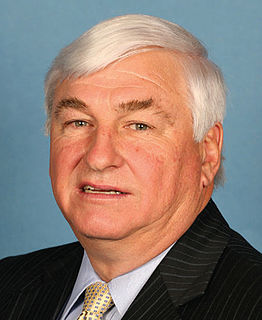A Quote by Allen Boyd
Though no one wants war, Congress needed to give the President the authority he needs to protect America while encouraging the use of diplomacy and negotiations to try and arrive at a peaceful solution to this problem.
Related Quotes
The dirty little secret is that both houses of Congress are irrelevant. ... America's domestic policy is now being run by Alan Greenspan and the Federal Reserve, and America's foreign policy is now being run by the International Monetary Fund [IMF]. ...when the president decides to go to war, he no longer needs a declaration of war from Congress.
Under Article II, all executive power is vested in one president of the United States. The regulatory state is Congress's efforts to undermine the president's authority. And my hope is we will see a president use that constitutional authority to rein in the uncontrollable, unelected bureaucrats and to rescind regulations.
With 450,000 U. S. troops now in Vietnam, it is time that Congress decided whether or not to declare a state of war exists with North Vietnam. Previous congressional resolutions of support provide only limited authority. Although Congress may decide that the previously approved resolution on Vietnam given President Johnson is sufficient, the issue of a declaration of war should at least be put before the Congress for decision.
Now Barack Obama, who campaigned for transparency, is the President defending secret negotiations on new trade agreements that are largely being written by corporate lawyers and lobbyists. He would give corporations the key to the treasury while he gets the authority to fast track another hammering of working people and the environment. Yet the only people who get a real tongue-lashing from this President's White House are progressives around town who dare to call him on the carpet for abandoning his promises.
America needs an ineffective president. That's much better than an effective president that's going to go to war with Russia, that's going to push for the Trans-Pacific Partnership, that's going to protect Wall Street, and that's going to oppose neoliberal austerity. I would much rather have an ineffective president than someone who's going to do these bad things that I fear is going to come from Hillary and the Democratic Party.
We have reached a moment in our history where we think that every problem in America has to have a federal government solution. Every problem in America does not have a federal government solution. In fact, most problems in America do not have a federal government solution and many of them are created by the federal government to begin with.
I see the war problem as an economic problem, a business problem, a cultural problem, an educational problem - everything but a military problem. There's no military solution. There is a business solution - and the sooner we can provide jobs, not with our money, but the United States has to provide the framework.
The president does not have power under the Constitution to unilaterally authorize a military attack in a situation that does not involve stopping an actual or imminent threat to the nation. As commander in chief, the president does have a duty to protect and defend the United States. In instances of self-defense, the president would be within his constitutional authority to act before advising Congress or seeking its consent.






























